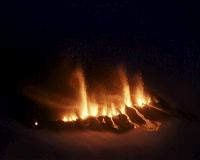| . |  |
. |
Reykjavik (AFP) April 20, 2010 Economic implosion, then volcanic explosion: not since the Viking raiders has Iceland been associated with so much tumult in Europe. There are only 317,000 people on this barren north-Atlantic island and until recently, with the exception of eccentric pop singer Bjork, they'd barely caught the outside world's attention. But now Iceland is famous -- infamous, even. The Eyjafjoell volcano on the south coast may have caused relatively little damage here since erupting last week. Only 700 people, mostly farmers, are affected and no one has been killed. Yet in Europe, ash from the hard-to-pronounce volcano has inflicted spectacular disruption, shutting down the continent's air travel network and stranding passengers around the globe. The ash cloud is the second storm from this once quiet corner in the near past. During the 2008 world economic crisis the country's high-flying main banks collapsed, taking with them the savings of 340,000 people in Britain and the Netherlands and forcing Iceland, until then among the world's wealthiest nations, to seek an IMF bailout. When the British and Dutch governments demanded 3.9 billion dollars compensation, furious voters in Iceland used a referendum to tell their powerful neighbors to get lost unless they came back with a fairer deal. A joke gleefully repeated since the volcano erupted relates that Britain "wanted cash, but because the Icelandic alphabet contains no letter C, they got only ash." Another quip goes like this: "When Iceland's economy died, its final wish was that its ashes would be spread across Europe." That humor is one way Icelanders are dealing with the shock of turmoil in their formerly stable country -- and with finding themselves in the unfamiliar position of being cast as villains abroad. One joke perfectly catches the absurdity of tiny Iceland, which doesn't even have a standing army, going out to bully the world. "You mess with Iceland?" goes the gag, in full Mafioso mode: "We shut down all your airports." The laughter masks soul-searching about how Iceland got into such a mess and about who should be held responsible. "It's been one thing after the other, a lot of stress," said farmer Berglind Hilmarsdottir, 53. "The economic disaster made people really angry. They were mad." Erna Kaaber, owner of a fish-and-chip restaurant in the capital Reykjavik, said Iceland lost its way during the "insane" economic boom leading to the banking crash, which an official report has blamed squarely on government incompetence. "We thought our image was all fresh and clear and clean," Kaaber, 36, said. "Suddenly we had people with private jets and flying helicopters to go buy a hot a hot dog. All this glamour -- it wasn't Icelandic." Many Icelanders believe the March referendum halting the government's plan to use taxpayer money and compensate Britain and The Netherlands at an exorbitant interest rate was a proud moment. The vote amounted to a revolt against a scheme that effectively would have punished regular people for problems caused by out-of-control banks. But if the banking fiasco embarrasses and upsets Icelanders, they feel no guilt regarding the havoc caused by the glacier-capped Eyjafjoell volcano. If anything, the eruption is healing social divisions caused by the economy and encouraging a return to older values. "The natural disaster has brought us together. In the manmade disaster people got so angry. They wanted heads to roll. But now everyone wants to help and we're proud of that," said photographer and film maker Svavar Jonatansson, 28. Thoroddur Bjarnason, a political science professor of at the University of Akureyri, agreed. "What the nation is going through now is totally different. This type of trouble brings people together and we handle things much better," he said. "We know it's not our fault at all. Even the farmers whose lifework is greatly affected if not ruined, are just calm and humble, knowing that there's nothing anyone can do."
Share This Article With Planet Earth
Related Links Bringing Order To A World Of Disasters When the Earth Quakes A world of storm and tempest
 Eruption tapering off, spewing less ash: experts
Eruption tapering off, spewing less ash: expertsReykjavik (AFP) April 19, 2010 Iceland's Eyjafjoell volcano has started spewing out less ash, a sign the eruption could be tapering off and that Europe's air traffic nightmare could be coming to an end, experts said Monday. "Currently the eruption has diminished markedly," Bryndis Brandsdottir of the University of Iceland told AFP, basing her comment on seismological radar readings in Reykjavik. "The ash column does n ... read more |
|
| The content herein, unless otherwise known to be public domain, are Copyright 1995-2010 - SpaceDaily. AFP and UPI Wire Stories are copyright Agence France-Presse and United Press International. ESA Portal Reports are copyright European Space Agency. All NASA sourced material is public domain. Additional copyrights may apply in whole or part to other bona fide parties. Advertising does not imply endorsement,agreement or approval of any opinions, statements or information provided by SpaceDaily on any Web page published or hosted by SpaceDaily. Privacy Statement |